Role of the army in sociopolitical processes of Spain in the first third of the 20th century.
Keywords:
Spain, crisis of constitutional-monarchist regime, armed forces, military juntas of defense, pronunciamento, military-monarchist dictatorship of M. Primo de RiveraAbstract
The article studies the political role of the army in Spain and its influence on the sociopolitical life of the country in the first third of the 20th century. The preconditions for transition from armed forces to arbiter of the internal political life are analyzed. The reasons for and manifestations of militarization of the Spanish society, the roots of authoritative tendencies in the system of state governance are studied. Using concrete example, the direct influence of military authorities on governmental decisions and law-making process has been proved. It has been established that military putsches in Spain were a traditional reaction of armed forces to crisis phenomena in the political system of the state. Thus, the establishment of the military-monarch dictatorship of General M. Primo de Rivera was a logical result of the constitutional-monarchist regime crisis in Spain.References
Payne S. G. El regimen de Franco. 1936–1975 / S. G. Payne. – Madrid: Alianza Editorial, 1987. – 682 р.
Balfour S. The Making of an Interventionist Army, 1898–1923 / S. Balfour // The agony of spanish liberalism: From revolution to dictatorship, 1913–1923 / Ed. by F. J. Romero Salvado and A. Smith. – New York: Palgrave Macmillan, 2010. – Р. 255–274.
Ross C. J. Spain since 1812 / C. J. Ross. – London: Hodder Education, 2009. – 214 p.
Romero Salvadó F. J. The Agony of Spanish Liberalism and the Origins of Dictatorship: A European Framework / F. J. Romero Salvadó, A. Smith // The agony of spanish liberalism: From revolution to dictatorship, 1913–1923 / Ed. by F. J. Romero Salvado and A. Smith. – New York: Palgrave Macmillan, 2010. – Р. 1–31.
González Calleja E. La razón de la fuerza. Una perspectiva de la violencia política en la España de la Restauración / E. González Calleja // Ayer. – 1994. – № 13. – Р. 85–113.
Политическая история Испании ХХ века / Г. И. Волкова, А. В. Дементьев. – М.: Высшая школа, 2005. – 191 с.
Bru Sánchez-Fortún A. Padrino y patrón. Alfonso XIII y sus oficiales (1902– 1923) / A. Bru Sánchez-Fortún // Hispania Nova. Revista de Historia Contemporánea. – 2006. – Núm. 6. – Р. 71–96.
Constitución de la Monarquía Española decretada y sancionada de acuerdo con las Cortes del Reino // Gaceta de Madrid. – 1876. – Núm. 184, de 2 julio. – Р. 9–12.
Ley para la represión de los delitos contra la Patria y el Ejército // Gaceta de Madrid. – 1906. – Núm. 114, de 24 de abril. – P. 317–318.
Alvarez J. E. From Empire to Republic: The Spanish Army, 1898–1931 / J. E. Alvarez // A Military History of Modern Spain: From the Napoleonic Era to the International War on Terror / Ed. by W.H. Bowen and J.E. Álvarez. – Westport/London: Praeger Security International, 2007. – Р. 37–52.
Boyd C. P. Praetorian politics in liberal Spain / C. P. Boyd. – Chapel Hill: University of North Carolina Press, 1979. – 376 p.
Іваницька О. Новітня історія Іспанії в життєписах королів. Альфонсо ХІІІ – король парадоксів / О. Іваницька. – Чернівці: Книги–ХХІ, 2006. – 232 с.
Romero Salvadó F. J. Spain 1914–1918: Between war and Revolution / F. J. Romero Salvadó. – London: Routledge, 2002. – 237 p.
Sánchez Jiménez J. La España Contemporánea (1875–1931) / J. Sánchez Jiménez. – Madrid: ISTMO, 1991. – 470 p.
Tamames R. Miguel Primo de Rivera y Orbaneja / R. Tamames, X. Casals. – Barcelona: Cara Cruz, 2004. – 260 p.

